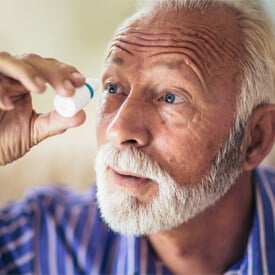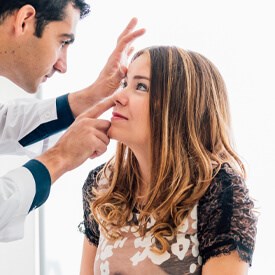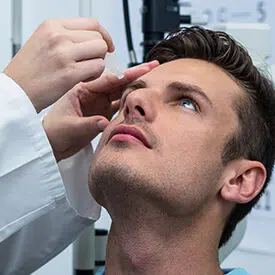Conjunctivitis in Lake Worth, FL
Conjunctivitis
What is Conjunctivitis?
Our board-certified ophthalmologists at Palm Beach Eye Center in Lake Worth, FL, have extensive experience in treating a variety of eye conditions, like pink eye. Known as conjunctivitis, pink eye can create uncomfortable symptoms and hinder your ability to see. Usually caused by bacteria, viruses, irritants, eye drops, allergic reactions, or STDs, our team can provide treatment solutions that reduce symptoms associated with the condition. We are pleased to provide eye infection treatments in Lake Worth, FL. Contact us today for more information.
What are the symptoms of pink eye?
Unfortunately, pink eye can occur in patients of all ages. During an exam, we review your symptoms and provide a treatment plan to eliminate your pink eye symptoms. Signs of pink eye may include:
- Weepy eyes
- Redness
- Swelling
- Yellow discharge
- Light sensitivity
- Itchiness
- Crusty eyelids or lashes in the morning
- Foreign body sensation in the eye
Sometimes, the eye may swell shut because of excess drainage. To learn more about the symptoms, contact our Palm Beach Eye Center to schedule an appointment.
What Causes Conjunctivitis?
Conjunctivitis can be triggered by several factors, including viral infections, bacterial infections, allergies, and exposure to irritants. Viral conjunctivitis is the most common type, often associated with the same viruses that cause the common cold and is highly contagious. Bacterial conjunctivitis is caused by bacteria and can spread through direct contact with an infected individual or contaminated surfaces. Allergic conjunctivitis results from a reaction to allergens such as pollen, dust, or pet dander. Lastly, irritants like smoke, chlorine in swimming pools, or wearing contact lenses for extended periods can cause a chemical conjunctivitis. Each type has distinct characteristics and treatments, emphasizing the importance of proper diagnosis and management.
What Are the Risk Factors for Conjunctivitis?
The risk factors for conjunctivitis include exposure to viruses or bacteria, which are the most common causes of the condition. Individuals with weakened immune systems or those who frequently touch their eyes or face are at higher risk. Allergies, such as pollen or pet dander, can also trigger allergic conjunctivitis. People who wear contact lenses, particularly if they don’t follow proper hygiene practices, are more susceptible to eye infections. Additionally, close contact with infected individuals, such as in crowded environments or daycare centers, increases the likelihood of contracting viral or bacterial conjunctivitis. Certain environmental factors, such as smoke or pollutants, can also irritate the eyes and contribute to conjunctivitis development.
What Are the Benefits of Conjunctivitis Treatment?
Getting the right care for conjunctivitis can make a noticeable difference in how quickly symptoms improve and how well your eyes stay protected moving forward. A few of the benefits may include:
- Faster symptom relief
- Reduced redness and irritation
- Lower risk of spreading infection
- Identification of the underlying cause
- Support for long-term eye health
- Personalized pink eye treatment in Palm Beach County
- Convenient conjunctivitis care in Lake Worth and Delray Beach
How is Conjunctivitis Diagnosed?
Conjunctivitis is diagnosed primarily through a comprehensive eye examination by a healthcare provider, often a primary care physician or an eye specialist (ophthalmologist or optometrist). During the exam, the doctor reviews the patient’s medical history and symptoms, and inspects the eye, including the eyelids, cornea, and conjunctiva. They may examine the eye’s discharge and test its reaction to different lights to distinguish between viral, bacterial, or allergic conjunctivitis. In cases where the cause isn’t immediately apparent or if the condition doesn’t respond to initial treatments, the doctor might take a sample of eye discharge to test for bacteria, viruses, or allergens. This diagnostic approach helps ensure the treatment plan is tailored to the specific type of conjunctivitis, leading to more effective management of the condition.
What are the treatments for conjunctivitis?
Your pink eye treatment options depend on the underlying reason for why it is occurring. Treatments may include antihistamines, antibiotic eye drops, and cold or warm compresses. During this time, patients should avoid wearing contacts. If you have disposable lenses, please throw away the pair you wore when you first started exhibiting symptoms. Additionally, we recommend replacing any eye makeup you used before your pink eye. Both action items will prevent the infection from returning after you have healed. Schedule an appointment to discover more about conjunctivitis treatment in Lake Worth, FL.
Conjunctivitis FAQ
How can I reduce pink eye discomfort?
Yes, resting your body is one of the main ways. You can also wash your hands frequently, rinse your eyes, and don’t rub or itch your infected eye.
How long does conjunctivitis last?
It ranges for each case, but on average, it can be anywhere from 4 – 15 days. This will depend on how extensive the infection is and when you start medical treatment.
Is treatment for pink eye painful?
Pink eye drops are commonly provided for bacterial infections. Some patients report stinging initially, but after a few days, the pink eye will start to subside.
How long does conjunctivitis last?
Viral conjunctivitis typically lasts 7-14 days, while bacterial conjunctivitis can clear up in a few days with antibiotics. Allergic conjunctivitis lasts as long as the allergen is present.
Should you stay home from work or school if you have pink eye?
For viral or bacterial conjunctivitis, it’s advisable to stay home to prevent spreading the infection to others. Typically, individuals can return to their daily activities when symptoms begin to improve, usually within 24 – 48 hours after starting appropriate treatment if it’s bacterial, or when the symptoms significantly lessen if it’s viral. For allergic conjunctivitis, which is not contagious, the decision to stay home should be based on the individual’s comfort and ability to perform tasks without spreading allergens to others.
How can I prevent conjunctivitis?
Wash your hands frequently, avoid touching your eyes, and do not share personal items like towels, makeup, or contact lenses.
Treat Pink Eye Quickly
Conjunctivitis or pink eye can cause a variety of uncomfortable symptoms that require professional assistance to treat. If you or a family member has pink eye, please schedule an appointment at Palm Beach Eye Center to go over treatment options. We can determine the underlying cause and provide the next best steps. Our group is dedicated to your eye health and to help you live more comfortably.
*Individual results are not guaranteed and may vary from person to person. Images may contain models.





